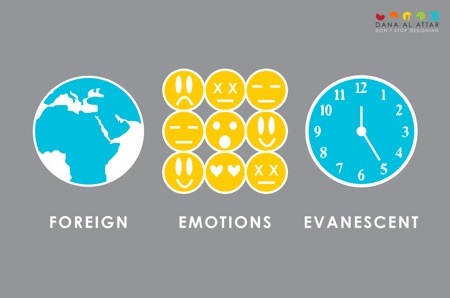
Ever wonder why people suddenly feel happy after having a good meal or sad after reading an extremely dramatic book? Ever wonder why it is always said that one should surround oneself by people they love and should avoid people that make them unhappy? The answer can be confined in 3 simple words ‘Foreign Emotions Evanescent’. In other words:
- Foreign: (adj) not familiar; strange
- Emotions: (noun) any strong agitation of the feelings
- Evanescent: (adj) of short duration; passing away quickly
Most people have a good grasp of their surroundings, they are usually able to comprehend what is happening around them and are aware of how to tackle the challenges they are faced with. But when it comes to keeping emotions in check, people lose track more often than they like to admit.
There are two types of foreign emotions, the “Direct” type and the “Indirect” type. The direct type is clear; it has a detectable effect and is straight forward; whereas the indirect type is hidden, unpredictable and shadowy.
The direct foreign emotions can last for a very long time or can go away in a few hours; the duration can be determined by how strong the direct effect is and how long it continues. For example, the happiness of a newlywed couple may last for a few months or for years depending on how well the marriage works out whereas someone who lost a leg and was badly injured in an accident may take years to recover.
There are many external factors that have a direct effect on emotions. Although they differ from one person to another, some of these factors are the same for many:
- Getting a promotion
- Hearing good news
- Winning an award
- Having an accident
- Losing a bet
- Falling sick
However, the direct foreign emotion isn’t the difficult type. The difficult type and the one related to the ‘Foreign Emotions Evanescent’ is the indirect foreign emotions.
Indirect foreign emotions usually have a built up force. Surprisingly enough, the factors that have an indirect effect are much simpler than people may imagine; and because they are simple, they usually slip by the radar very easily.
These indirect emotions creep up on us and affect us without prior notice. They also disappear quickly because in most cases, people don’t realize what had caused the foreign emotion, hence the name ‘Foreign Emotions Evanescent’.
There are many examples of indirect foreign emotions, some of the more simple ones are:
- Movies
- Songs
- Books
- People
- Weather
- Food
The more aware a person is of the factors that affect their emotions indirectly and understands the vibes they give out, the easier it is to detect how they might affect them.
People should also know that these emotions are foreign, they aren’t the person’s true feelings; they are external emotions that have piggybacked because they can.
Always remember, ‘Foreign Emotions Evanescent’, they are feelings that will not last for long because they have come from somewhere else.




Interesting read. I never thought of my emotions that way.
Very insightful. Thank you!